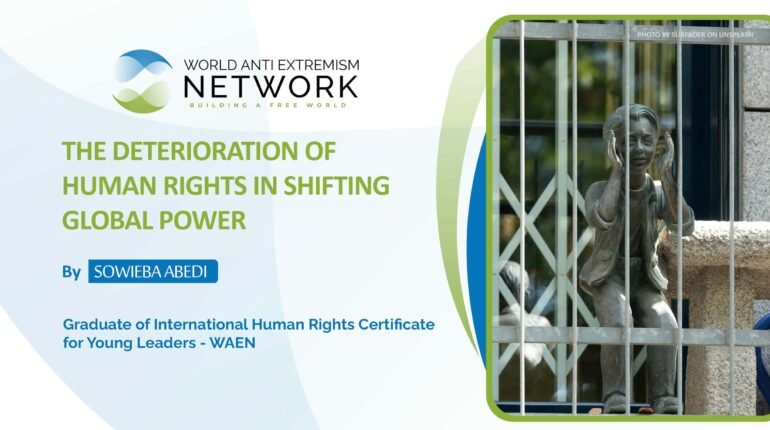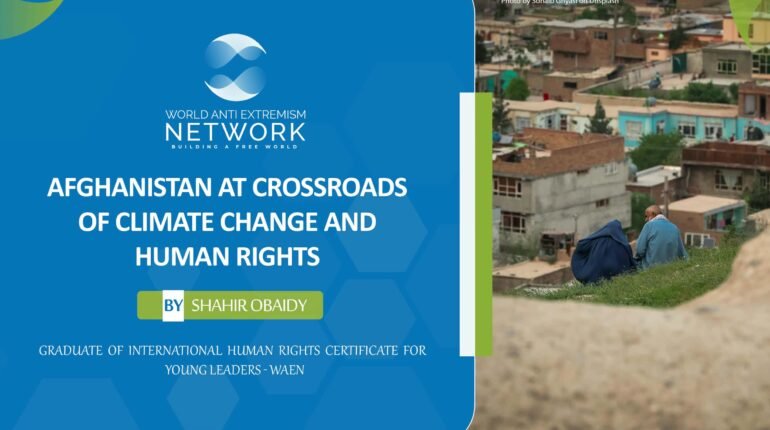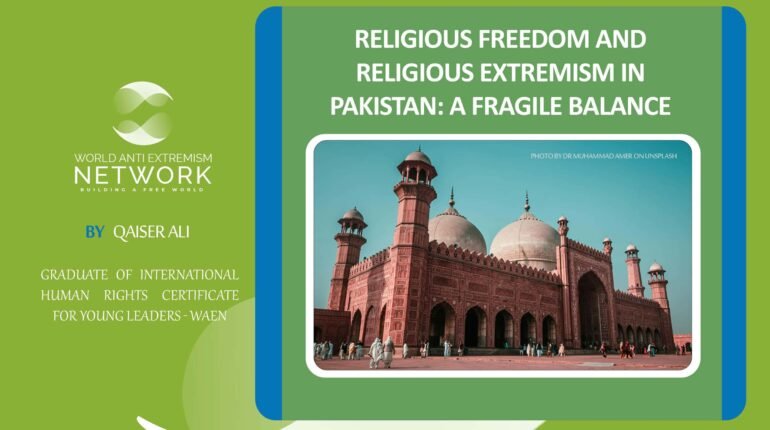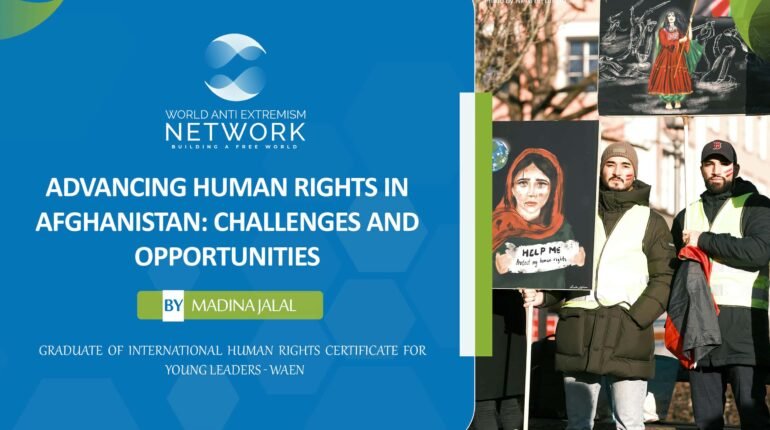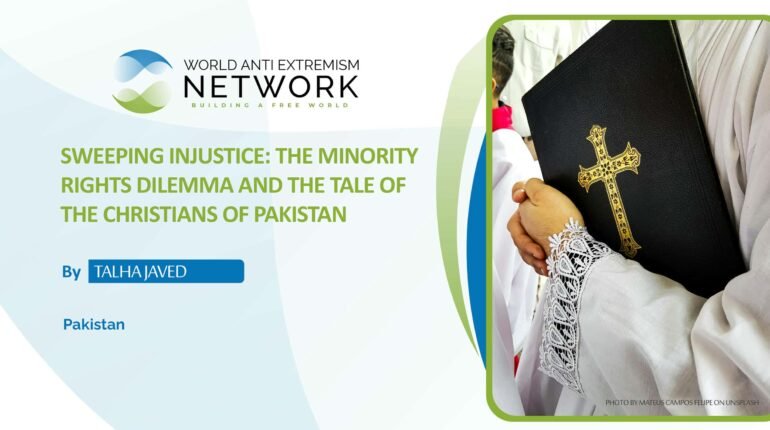Religious Freedom and Religious Extremism in Pakistan: A Fragile Balance
- World Anti Extremism Network
- Religious Freedom and Religious Extremism in Pakistan: A Fragile Balance
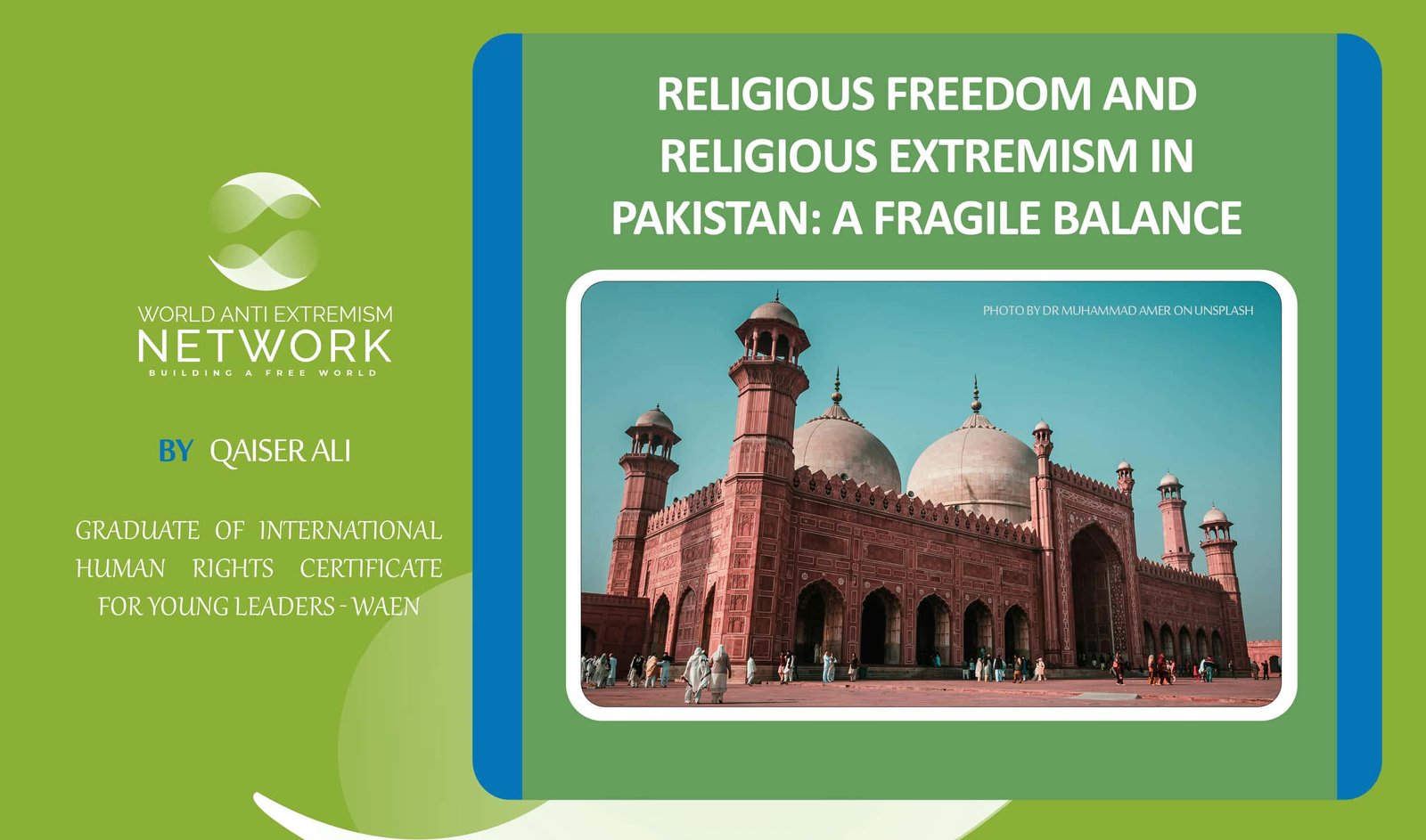
- Religious Freedom and Religious Extremism in Pakistan: A Fragile Balance
- By QAISER ALI
- Jul 1, 2025
Share on:
Introduction
Pakistan was established in 1947 as a separate homeland for Muslims, rooted in the Two-Nation Theory. This theory asserted that Hindus and Muslims were two distinct nations, each with its own beliefs, cultural traditions, and historical heroes. Muhammad Ali Jinnah, the Founder of Pakistan, envisioned the country as a home to religious minorities and religious diversity. In his historic address to the Constituent Assembly on August 11, 1947, Jinnah declared, “You are free; you are free to go to your temples, you are free to go to your mosques or any other place of worship in this State of Pakistan.” They were granted the right to religious freedom and its propagation in the Constitution, but they were subjected to law, public order, and morality. This Constitutional protection stands in contrast to the lived reality of minorities. Who knew that even after 70 years, minorities would be suffocated? The roots of this extremism and systemic persecution trace back to General Zia’s Islamization policies of the 1980s. While Zia declared that the country would follow Nizam-e-Mustafa, it was not implemented in its true letter and spirit. His misuse of the concept ultimately endangered the lives of religious minorities. Strict blasphemy laws were also introduced. Even before Zia, the Ahmadiyya community was marginalized. They were declared non-muslims by Zulfiqar Ali Bhutto’s government. Many see this as a constitutional win, but this move failed Jinnah’s vision of plurality. These policies of Zia empowered extremist groups, such as Sipah-e-Sahaba Pakistan and Lashkar-e-Jhangvi, whose influence we see today. Coupled with societal prejudices and institutional failures, these factors have created a climate where religious minorities such as Ahmadis, Christians, Hindus, Shias, and Sikhs face persecution, ranging from targeted killings to forced conversions. This article explores the legal commitments of religious freedom, the cases of religious persecution, and the effects of religious extremism.
The Legal Commitments and Their Contradictions
The Constitution of Pakistan 1973 declares Islam as the State Religion; rather, it should have been a secular state to accommodate other religious factions. Pakistan’s constitution guarantees religious freedom, but at the same time inserts Blasphemy Laws which attack those guaranteed freedoms. Such laws have often been misused for blackmail, land grabbing, and personal gain. These incidents will be discussed in detail later. The Ahmadiyya community is explicitly declared non-Muslim under Article 260(3) of the Constitution, barring them from practicing or professing their faith publicly. The blasphemy laws have been a focal point of criticism by international human rights organizations. The UN Special Rapporteur on Freedom of Religion or Belief, Ahmed Shaheed, noted in 2023 that these laws “create havoc” by emboldening extremists and undermining law and order. The Human Rights Commission of Pakistan (HRCP) reported 585 blasphemy cases in 2021 alone, predominantly in Punjab, often targeting minorities like Christians and Ahmadis. Another report indicates that over 750 persons were incarcerated on charges of blasphemy as of October 2024. At least four faith-based killings are documented, three of which targeted the Ahmadiyya community.
In one of the landmark judgements by the Supreme Court, the Supreme Court recognized the right of minorities (including Shia Muslims) to religious freedom and dignity. The Court also directed the government to ensure the protection of minority places of worship.
In a Suo motu case of the Supreme Court of Pakistan, the Court reinstated the formation of a special task force to protect minorities, the establishment of a National Council for Minorities, action against hate speech, and curriculum reform. Protection of places of worship for all religious groups. The Court also reaffirmed that religious freedom is a cornerstone of Pakistan’s constitutional scheme.
While there exist legal protections for religious freedom but Pakistan has time and again failed its religious factions. They have been persecuted for decades, be it Christians, Hindus, Hazaras, or Shias. Pakistan needs to formulate minority-friendly policies to foster an environment of peace and development.
Religious Extremism and Persecution
Religious intolerance and extremism in Pakistan have roots in the Islamization policies of the 1980s (Zia’s dark times), which led to the growth of extremist factions like Sipah-e-Sahaba Pakistan (SSP) and Lashkar-e-Jhangvi (LeJ). These groups have targeted Shia Muslims, Ahmadis, Christians, Hindus, and Sikhs, regarding them as Kaafir (heretics) and these militants are roaming freely to the date. The HRCP’s 2021–2022 report, A Breach of Faith: Freedom of Religion or Belief, highlighted consistent incidents of forced conversions, desecration of minority worship sites, and marginalization of Ahmadis. Among religious minorities, the Hazara community has been persecuted the most in the past. As per reports, the Hazara community digs mass graves every year due to the slaughter of Pakistan’s Hazara.
Key Incidents of Persecution/Extremism
Let’s just call a spade a spade. These extremist facts have always mob-lynched people/minorities for silencing them or settling personal scores. The following are a few incidents of persecution in Pakistan.
- Ahmadiyya Community: Ahmadis face severe persecution, including targeted killings and barring them from offering prayers in mosques and even stopping them from calling their religious places ‘Mosques’. Between 1984 and 2019, 262 Ahmadis were killed due to their faith, with seven murders reported between July 2020 and September 2021. In November 2021, the national spokesperson for the Ahmadiyya community was charged under blasphemy laws, prompting condemnation from the United Nations. More recently, Ahmadis have been excluded from celebrating Eid, including being prohibited from performing the ritual animal sacrifice on Eid-ul-Adha. In several instances, cases were filed against members of the Ahmadiyya community for carrying out the sacrifice.
- Christians: The 2023 Jaranwala (Faisalabad) incident in Punjab saw mobs burn churches and homes over unverified blasphemy allegations, fueled by local clerics. The U.S. Commission on International Religious Freedom (USCIRF) noted a “sharp rise” in targeted killings and hate speech against Christians in 2021. As of January 2025, at least 25 Christians languish in Pakistani prisons for blasphemy charges.
- Hindus: Forced conversions of Hindus in rural Sindh have been the biggest issue, with estimates of 1,000 cases annually. Courts often rule these conversions as “voluntary,” leaving victims with their abductors.
- Shia Muslims: Despite being Muslims, Shias in Pakistan have long faced sectarian violence. In 2024, an attack claimed the lives of 44 Shia, reflecting a broader pattern of extremist violence carried out by militant groups and the Taliban.
Human Rights Watch (HRW) emphasized in 2023 that authorities must end legal discrimination and hold perpetrators accountable. The standardized national curriculum, criticized by the HRCP for creating an “exclusionary narrative,” further marginalizes minorities by emphasizing Islamic identity over pluralism. Additionally, the judiciary’s complicity, as seen in cases like Rinkle Kumari’s, where courts upheld forced conversions, highlights systemic biases.
A Ray of Hope:
Despite these challenges, there are glimmers of hope. Civil society activists, journalists, and human rights defenders continue to advocate for pluralism, often at great personal risk. In 2016, Sindh’s provincial assembly passed a bill outlawing forced conversions, though it was never ratified. Prime Minister Imran Khan’s 2020 commitment to protect minority worship sites and the Supreme Court’s 2014 ruling expanding the scope of religious freedom under international human rights law offer potential frameworks for reform.
Recommendations/Reforms:
To counter violent extremism and uphold religious freedom, Pakistan needs to amend/repeal the Blasphemy Laws, which have been used for illicit purposes. Recently, Blasphemy Business Group (BBG) was exposed as being involved in targeting youth and trapping them in blasphemy, but the cases are still pending in the Court. Pakistan should enact and enforce laws criminalizing forced conversions and protecting minority worship sites. It needs to revise the curriculum to foster diversity and plurality. Pakistan should support grassroots initiatives promoting interfaith harmony and amplify moderate voices within Pakistan.
Conclusion:
Since Pakistan was founded as a pluralist state but it has failed to protect religious minorities. Though the Constitution guarantees religious freedom and other liberties, the state has failed to counter extremist narratives and bring perpetrators to justice. By addressing legal, societal, and institutional challenges, Pakistan can uphold Jinnah’s legacy of plurality/diversity and fulfill its international obligations under Article 18 of the Universal Declaration of Human Rights (UDHR). The change in our society requires courage, reform, and a commitment to inclusivity to heal a wounded society. Let’s stand together to uphold democratic principles, advocate for human rights and liberty, and make this society a livable place for everyone, irrespective of religion or other differences.

About the Author
Qaiser Ali is a final-year law student at Bahauddin Zakariya University, Multan. He serves as a Senior Local Coordinator with Students For Liberty, a certified Mediation Counsel, and a Global Ambassador for the World Anti-Extremism Network. His work focuses on human rights, constitutional law, and promoting liberty in conflict-affected regions. Hailing from Parachinar, a conflict-affected region, he brings a deep personal understanding of the consequences of extremism and weak governance to his activism and legal work. Whether it’s through grassroots activism or global conversations, he believes in creating space for freedom, dignity, and meaningful change.
The opinions expressed in these articles are solely those of the authors and do not reflect the views or positions of the organization. If you find any information incorrect, please contact (research@worldantiextremism.org), and we would be happy to assist you. You can download, distribute, and reuse this work, provided you credit the author and cite the original source.
Related Articles
Subscribe to our newsletter and stay updated.
Contact
Toronto, Ontario, M1L 0E5 Canada
Subscribe to our newsletter and stay updated.
Contact
Toronto, Ontario, M1L 0E5 Canada
Subscribe to our newsletter and stay updated.
Contact
Toronto, Ontario, M1L 0E5 Canada


